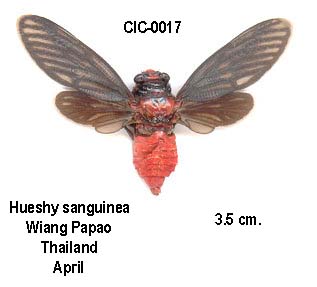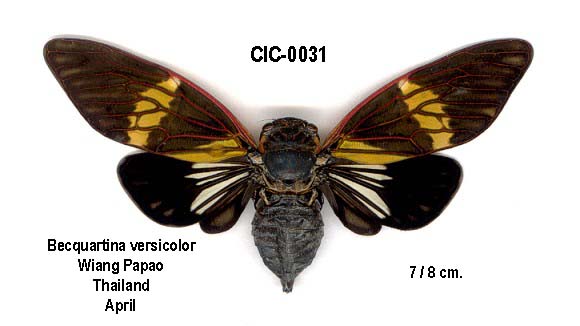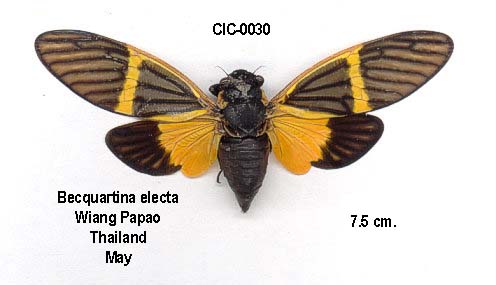Huechys sanguinea is a cicada found in Burma, China, India, Indonesia, Malaysia, Pakistan, Thailand, and likely many other nations in Asia. There are at least 5 subspecies of this cicada. It is also known as the “medicinal cicada” because people use it as a medicine (see my translation below).
Photo by Michel Chantraine:

Description1:
Body and legs black; front and face to head, two large spots to mesonotum — sometimes fused and covering the whole disk — and the abdomen, sanguineous; base of abdomen narrowly black.
Tegmina black, opaque; wings shining fuscous, sometimes almost black, the interior of the anal area always paler.
Rostrum passing the intermediate coxae; face moderately compressed, and very coarsely striate.
Long. excl. tegm. Male and Female 17 to 25 millim. Exp. tegm. 43 to 65 millim.
Here’s my translation, from French, of a note about the medicinal properties of the cicada. The original text comes from A Monograph of Oriental Cicadas:
According to Dr. Fumouze, “Huechys sanguinea, the Cicada sangiunolenta d’OIivier, is a very strong [common] insect in certain provinces of China, where it is harvested for the needs [valuable medicinal properties] of the species. In China, this insect would pass into China to enjoy curative properties, and it would be used chiefly in the treatment of rabies, but its value as much as the medicine against rabies is doubtful, but its action on the genitourinary organs seems to be certain, and this is what is in the fore, if the Huechys sanguinea would not yield a particular or similar active ingredient to the cantharides, what I can say now, it is because, by the procedures used to extract Cantharidin from cantharides, I have obtained no results, perhaps I will be later after that, but my first researches have not been completely unsuccessful, because I arrived to extract from Huechys sanguinea the material which gives to the abdominous teguments of this insect their magnificent yellow-orange color. This matter, which I will call Huechys’ red, is of a color exactly like that of the abdomen of the animal, as you can see by means of a sample which I put before your eyes. Huechys sanguinea also contains, but in smaller quantities, another yellowish, hygrometric dying material. “- Btdl. Soc. Ent. Fr. 1888, pp. xxii., xxiii.
TL;DR = “People use it to treat rabies, but it’s doubtful it actually works as a rabies treatment. It does work for its ‘Viagra-like’ properties. And its red pigment can be extracted.”
Scientific classification:
Family: Cicadidae
Subfamily: Cicadettinae
Tribe: Cicadettini
SubTribe: Huechysina
Genus: Huechys
Species:
- Huechys sanguinea hainanensis Kato, 1931
- Huechys sanguinea philaemata (Fabricius, 1803)
- Huechys sanguinea sanguinea (Degeer, 1773)
- Huechys sanguinea suffusa Distant, 1888
- Huechys sanguinea wuchangensis Liu, 1940
For more information about this cicada, visit Cicadas of India.
References:
- The description and location information comes from A Monograph of Oriental Cicadas by W. L. Distant. 1889-1892. Read it on the Biodiversity Heritage Library website.
- Species name information comes from Allen Sanborn’s Catalogue of the Cicadoidea (Hemiptera: Auchenorrhyncha).
- Tribe information comes from: MARSHALL, DAVID C. et al.A molecular phylogeny of the cicadas (Hemiptera: Cicadidae) with a review of tribe and subfamily classification.Zootaxa, [S.l.], v. 4424, n. 1, p. 1—64, may 2018. ISSN 1175-5334. Available at: https://www.biotaxa.org/Zootaxa/article/view/zootaxa.4424.1.1


